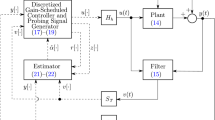Abstract
Handling delays and uncertain parameters in control systems is an interesting and challenging class of problems. In this paper, we consider the problem of “bounded-input bounded-output stabilizing” a class of single-input single-output, linear time-varying plant models with a time-delay margin as large as desired and a considerable amount of uncertainty in the input matrix of the state-space model. The proposed controller, while periodic and mildly nonlinear, is of low complexity; it tolerates slow variations in the delay and the elements of the input matrix as well as occasional jumps in these parameters, and guarantees that the effect of the initial condition decays exponentially to zero, even in the presence of noise.








Similar content being viewed by others
Notes
If the closed-loop system were LTI, then this kind of stability is simply the classical bounded-input bounded-output (BIBO) notion of stability.
Roughly speaking, by this we mean that the estimate corresponds to a system for which we have maintained controllability.
Normally, \(\mathrm{sgn}(0)\) is defined to be zero.
For the plant model to be causal, we need y(t) to depend solely on x(t) and \(\{ u ( \theta ) : \theta \in [0, t] \}\) for \(t \ge 0\). This will be guaranteed if \(\tau (t)\) is always non-negative.
We have imposed a technical requirement that these variables are continuous from the right to simplify the proofs.
We delay d by \(\overline{\tau }\) seconds, so that d from time \(-\overline{\tau }\) to \(\infty \) is included in the norm of \(\overline{w}\).
Note that if there is no noise and we have zero initial conditions, then for every \(\tau \in [0, \overline{\tau }]\), we have that \(u(t-\tau ) = 0\) for \(t \in [kT, kT+T_1)\); this property is critical for the design of the state estimator.
If \(\tau (t)\) is constant for all \(t \ge 0\), then \(a[k] = T_1+\tau \) and \(b[k] = T_1+T_2+\tau \) for all \(k \ge 0\).
Checking to see if \(\check{B}_d[k] \) lies in \(\hat{\mathcal{B}}_d\) is easy: simply compute the norm of \(\check{B}_d[k] \) and the determinant of the related controllability matrix.
For every \(B_d \in \hat{\mathcal {B}_d}\), we have that \((A_d, B_d)\) is controllable, which implies that \(F(B_d)\) is unique.
We choose \(\rho > 0\) so that both terms on the RHS of (21) have the same sign; this means, in particular, that \(\nu [k] = 0\) iff \(\chi [k] = 0\).
Since the Eq. (23) contains both \(B_d[k]\) and \(B_d[k-1]\), clearly this solution depends on both quantities.
Note that \(\check{B}_d\) may not belong to \(\ell _\infty \); however, this signal is intermediary in nature and is used in the description of K to enhance clarity.
This holds even if there are switches in B(t) and \(\tau (t)\).
References
Bekiaris-Liberis N, Krstic M (2013) Nonlinear control under nonconstant delays. SIAM, Philadephia, PA
Bresch-Pietri D, Chauvin J, Petit N (2012) Adaptive control scheme for uncertain time-delay systems. Automatica 48:1536–1552
Bresch-Pietri D, Chauvin J, Petit N (2014) Prediction-based stabilization of linear systems subject to input-dependent input delay of integral type. IEEE Trans Autom Control 59(9):2385–2399
Bresch-Pietri D, Krstic M (2009) Adaptive trajectory tracking despite unknown input delay and plant parameters. Automatica 45(9):2074–2081
Bresch-Pietri D, Krstic M (2010) Delay-adaptive predictor feedback for systems with unknown long actuator delay. IEEE Trans Autom Control 55(9):2106–2112
Bresch-Pietri D, Petit N (2014) Robust compensation of a chattering time-varying input delay. In: Proceedings of the 53rd IEEE conference on decision and control, pp 457–462
Francis B, Georgiou T (1988) Stability theory for linear time-invariant plants with periodic digital controllers. IEEE Trans Autom Control 35(9):820–832
Gao H, Chen T, Lam J (2008) A new delay system approach to network-based control. Automatica 44(1):39–52
Gaudette D, Miller DE (2011) Sampled data adaptive controllers for systems with unknown time delays. In: Proceedings of the IFAC World Congress, Milan, pp 7654–7659
Gaudette D, Miller DE (2014) Stabilization in the presence of an uncertain arbitrarily large delay. IEEE Trans Autom Control 59(9):2234–2339
Gaudette DL, Miller DE (2012) Stabilizing any SISO LTI plant with an arbitrarily large uncertain gain and delay. In: Proceedings of the 51st IEEE conference on decision and control, pp 1554–1559
Gaudette DL, Miller DE (2013) Stabilizing any siso lti plant with an arbitrarily large unknown delay and unknown B matrix. In: Proceedings of the 52nd IEEE conference on decision and control,pp 1602–1607
Khargonekar P, Tannenbaum A (1985) Non-Euclidian metrics and the robust stabilization of systems with parameter uncertainty. IEEE Trans Autom Control 30(10):1005–1013
Kitagawa G (1977) Algorithm for solving matrix equation X = FXFT + S. Int J Control 25(5):745–753
Michiels W, Engelborghs K, Vansevenant P, Roose D (2002) Continuous pole placement for delay equations. Automatica 38(5):747–761
Middleton RH, Miller DE (2007) On the achievable delay margin using LTI control for unstable plants. IEEE Trans Autom Control 52(7):1194–1207
Miller DE (2006) Near optimal LQR performance for a compact set of plants. IEEE Trans Automatic Control 51(9):1423–1439
Miller DE, Davison DE (2005) Stabilization in the presence of an uncertain arbitrarily large delay. IEEE Trans Autom Control 50(8):1074–1089
Niculescu S, Annaswamy AM (2003) An adaptive smith-controller for time-delay systems with relative degree \(n^* \le 2\). Syst Control Lett 49(5):347–358
Nounou HN, Nounou MN (dec. 2008) Resilient Adaptive control of uncertain time-delay systems—a delay-dependent approach. In: Proceedings of the 47th IEEE conference on decision and control, pp 4001–4006
Smith OJM (1957) Closer control of loops with dead time. Chem Eng Progr 53(5):217–219
Author information
Authors and Affiliations
Corresponding author
Additional information
This work was supported by the Natural Sciences and Engineering Research Council of Canada via a research grant.
Rights and permissions
About this article
Cite this article
Gaudette, D.L., Miller, D.E. Adaptive stabilization of a class of time-varying systems with an uncertain delay. Math. Control Signals Syst. 28, 16 (2016). https://doi.org/10.1007/s00498-016-0166-5
Received:
Accepted:
Published:
DOI: https://doi.org/10.1007/s00498-016-0166-5



